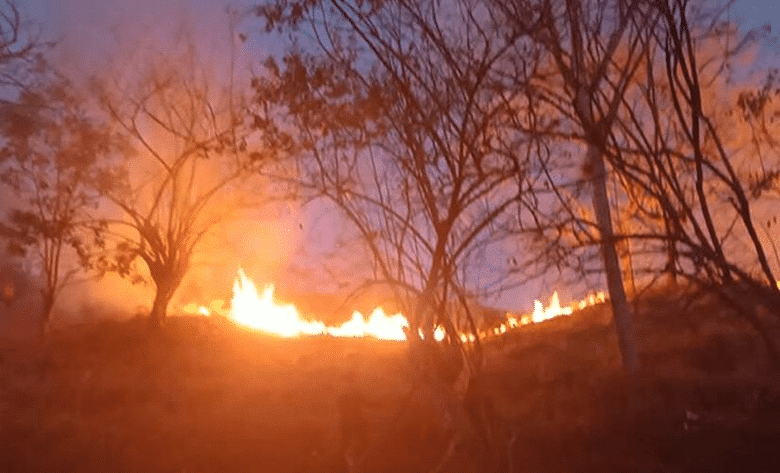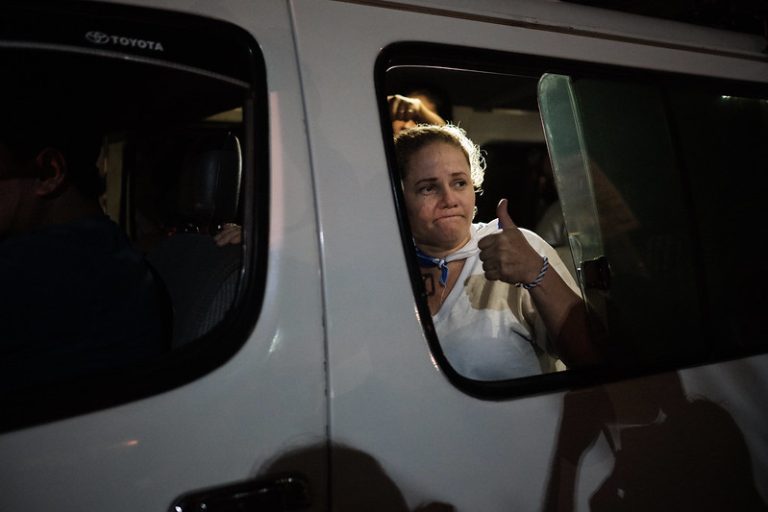24 de noviembre 2019

Nicaragua Records 888 Forest Fires So Far in 2024

PUBLICIDAD 1M
PUBLICIDAD 4D
PUBLICIDAD 5D
Family members of the political prisoners suspended their hunger strike and were evacuated in order to safeguard the life of Father Edwin Roman

Desperation and fear began to spread among the fourteen persons blockaded into the San Miguel Church in Masaya on Friday morning. Their reserves of water and oral rehydration solution had run out, as well as medicine for the parish priest, Father Edwin Roman, who suffers from diabetes. It was the priest himself who asked the group to suspend their hunger strike.
“For my health,” he requested. And the group, given the immense respect that they have for the religious leader, agreed unanimously to accept. “For the life of us all, but principally for the Father’s life,” lawyer Yonarqui Martinez declared on Friday morning from her hospital bed in Managua’s Vivian Pellas Municipal Hospital. Yonarqui Martinez had accompanied the mothers in the parish church and was hospitalized yesterday, but now has been declared out of danger.
By Friday morning, the group of nine family members, plus Martinez and activist Flor Ramirez, had completed nine days of a hunger strike, demanding that the regime of Daniel Ortega free all the political prisoners. Ortega’s response was to isolate them from the public, essentially imprisoning them in the Church behind a cordon of armed police and paramilitary who wouldn’t allow anybody to bring them aid. In addition, he ordered the electricity and water services to the church to be cut off.
Roman was able to use his cell phone, which he charged using the motor of his small yellow Suzuki 800 that was left parked inside the rectory with a full tank of gasoline. He called Cardinal Brenes, as he’d been doing twice a day ever since the strike began.
“The group wants to leave, they’re going to suspend the strike,” Roman informed Brenes, after telling him all that was happening in the church.
From the beginning, Father Roman had steadfastly declared that he felt it a moral and spiritual duty to accompany the mothers and the victims. “It’s my ministry,” the sixty-year-old priest expressed.
“During all this time, Father Edwin’s will to remain accompanying these people morally, spiritually, and physically has been respected,” stated a press note issued by the Managua Archdiocese on Friday night.
Cardinal Brenes, a man of extreme prudence, felt relieved. For the past week, the situation of Father Roman had him feeling asphyxiated. On social media, people criticized him for not going to Masaya to try and aid the parish priest.
“I have to care for Father Roman,” he stated a few days ago in an interview with Confidencial. In the same interview, he revealed – without offering any specifics – that he was working like an ant to resolve the situation in Masaya.
Following the priest’s telephone call, Brenes informed the Apostolic Nuncio, Waldemar Stanislaw Sommertag. According to the Archbishop’s press note, they then “initiated the necessary contacts with the authorities to open a humanitarian channel for the private ambulances to enter, in order to transport all the people who had been shut in the Church for nine days to the Vivian Pellas Hospital to receive medical attention.”
The government’s green light for the ambulances arrived on Friday afternoon. The Police allowed the two ambulances to enter. One belonged to the Vivian Pellas Hospital, and one to the Nicaraguan Red Cross that performed the labors of accompaniment. The police then cordoned off the area once again so that no one could enter the perimeter around the San Miguel Church.
The neighbors, however, defied the information blackout. A video taken from a corner of the Church showed each one of the mothers and their accompaniment leaving through a small door in the rectory and getting into a mini-van that had been converted into an ambulance. The last one to get in was Father Roman.
The ambulances left the city swarming with members of the riot squad and made their way towards the Masaya Highway. Minutes before 5:00 p.m., the 14 people entered the hospital.
“According to the preliminary exams, all are stable,” Dr. Maria Eugenia Espinoza, medical director of the Vivian Pellas Hospital, stated just outside the building.
Espinoza said that some of them were dehydrated “due to the prolonged fast”, but that all were out of danger. Eventually, eleven were released on Friday night, and only three remained hospitalized: Father Roman, Yonarqui Martinez, and Flor Rivera.
“We remain strong, this dictatorship is going to fall soon, this small group made Daniel Ortega shake with fear. And as far as them leaving [office], they’re leaving,” stated Maria Gomez upon exiting the hospital. Gomez was one of those who were on the hunger strike, demanding freedom for her friend from Chontales, Ulises Rivas.
Gomez said that the group had been evacuated by a delegation from the International Red Cross. However, a spokesperson of that organization, based in Mexico, told Confidencial that they hadn’t participated. “They’ve confirmed that we weren’t there in Masaya,” he asserted on Friday afternoon.
“We survived with water,” stated Gomez. “We ended the strike because of the Father’s health. We didn’t want to abandon the struggle, but we did so for the Father,” she repeated.
The mothers and family members of the political prisoners left the hospital at approximately 8:00 p.m. From the vehicle they yelled in chorus, “Mothers don’t give up, they demand justice.”
“We’ll keep fighting”, they warned. “We’re going to achieve the freedom of all the political prisoners.”
PUBLICIDAD 3M
Periodista. Tiene 16 años de experiencia como reportero de prensa escrita y televisión. Escribe sobre crimen organizado, derechos humanos y política. Premio a la Excelencia Periodística Pedro Joaquín Chamorro.
PUBLICIDAD 3D